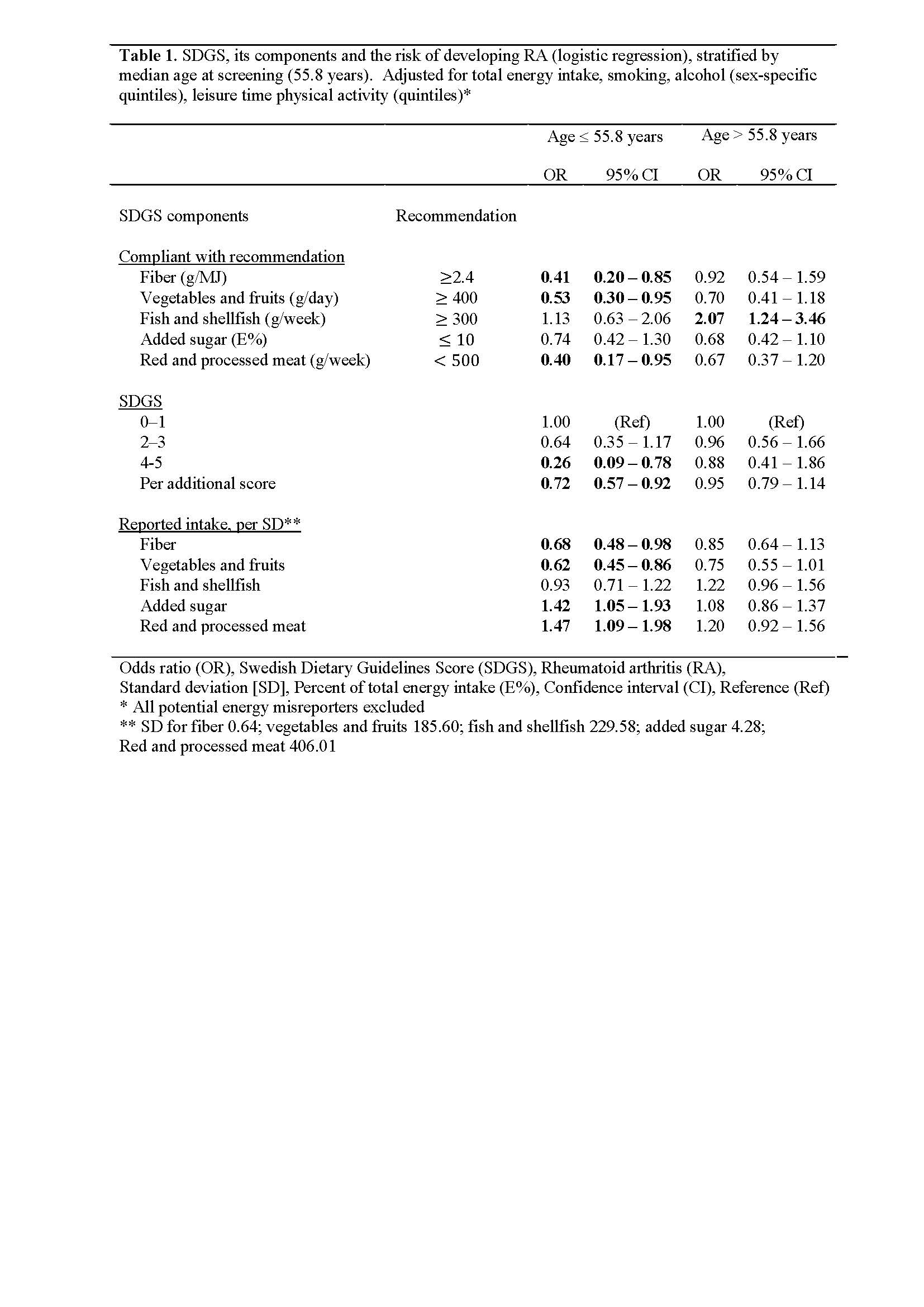Session Information
Session Type: Poster Session C
Session Time: 10:30AM-12:30PM
Background/Purpose: Healthy eating habits might prevent the development of rheumatoid arthritis (RA). The impact of such lifestyle factors on the risk of RA may differ across age groups. We previously reported a reduced risk of RA among individuals who adhere to dietary recommendations, particularly regarding higher intake of vegetables and fruit and reduced consumption of red/processed meat. In a post hoc analysis, we investigated the relation between adherence to dietary recommendations and the risk of RA in models stratified by age.
Methods: A nested case-control study was conducted within a population-based survey performed in 1991-1996. Incident cases of RA were identified through linkage with patient registers up to December 2016, and the diagnoses were validated according to established criteria. Four controls for each case, matched for sex, year of birth, and year of inclusion, were included. The controls were alive and free of RA when the index person was diagnosed with RA. Diet was assessed using a modified diet history method comprising of a seven-day menu book, a diet history questionnaire, and a complementary diet history interview. The cutoff values for the recommendations in the Swedish Dietary Guidelines (SDG) from 2015 are based on the Nordic Nutrition Recommendations from 2012 and the WHO guidelines from 2015. Logistic regression analysis, taking into account the matched design of the study, was applied to investigate the relation with future RA for fibers, vegetables and fruit, fish, added sugar and red/processed meat as dichotomous (compliant with recommendation or not) and continuous variables per standard deviation. Furthermore, we assessed the impact of the SDG score (SDGS; 1 point for adherence to each recommendation, total 0-5) on the risk of RA. Analyses were adjusted for factors that have been associated with both diet and RA (smoking, alcohol and leisure time physical activity). All models were adjusted for reported total energy intake, and stratified by age at inclusion in the health survey (above vs below the median). Misreporters of total energy intake were excluded.
Results: A total of 305 incident cases of RA were identified (76% women, mean time from screening to diagnosis 12 years). A high adherence (SDGS 4-5 vs 0-1) was associated with a reduced risk of future development of RA (odds ratio 0.26; 95% confidence interval 0.09-0.78) among survey participants aged ≤55.8 years, whereas there was no such association among older individuals (Table 1). Younger individuals who were adherent to recommendations on fiber, vegetables and fruit, and red/processed meat, had a lower risk of RA. There were corresponding associations with quantified intakes of each of these diet components in the younger group, but not in the older age group (Table 1).
Conclusion: Adherence to dietary recommendations, including high intakes of fiber and vegetables and fruit, and limited consumption of red/processed meat, may reduce the risk of RA in younger individuals. These findings suggest that the impact of lifestyle factors such as diet on future RA development may vary by age, potentially reflecting distinct early disease mechanisms.
To cite this abstract in AMA style:
Bäcklund R, Bergström U, Compagno M, arvidsson L, Rydell E, Sonestedt E, Turesson C. The Importance of Adherence to Dietary Recommendations for Rheumatoid Arthritis Risk May Be Greater in Younger Individuals – Results from a Nested Case-Control Study [abstract]. Arthritis Rheumatol. 2025; 77 (suppl 9). https://acrabstracts.org/abstract/the-importance-of-adherence-to-dietary-recommendations-for-rheumatoid-arthritis-risk-may-be-greater-in-younger-individuals-results-from-a-nested-case-control-study/. Accessed .« Back to ACR Convergence 2025
ACR Meeting Abstracts - https://acrabstracts.org/abstract/the-importance-of-adherence-to-dietary-recommendations-for-rheumatoid-arthritis-risk-may-be-greater-in-younger-individuals-results-from-a-nested-case-control-study/

